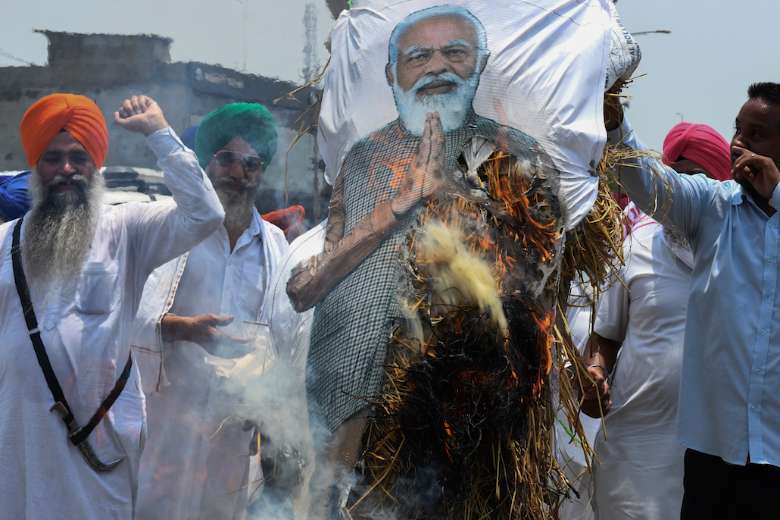Narendra Modi’s cabinet reshuffle was more out of compulsion than a meticulously planned strategy


Farmers burn an effigy of Indian Prime Minister Narendra Modi during a protest against an increase in petrol, diesel and cooking gas prices at the Golden Gate in Amritsar on July 8. (Photo: AFP)
India’s Prime Minister Narendra Modi, facing an onslaught of opposition parties and left-liberal writers and activists for alleged multipronged failures to deal with the Covid-19 crisis, carried out a massive reshuffle of his ministers on July 7.
In the process he dropped the federal health minister, Dr. Harsh Vardhan, a medico and a lawmaker from Delhi, in a move which the opposition Congress and other parties are already saying was an admission of guilt.
The second wave of the pandemic in April-May left a devastating fallout with hundreds of deaths including many due to oxygen shortages and other mismanagement in hospitals.
P. Chidambaram of Congress, a former federal home and finance minister, tweeted that Vardhan’s departure “is a candid confession that the Modi government has utterly failed in managing the pandemic.”
Thus the surgery Modi carried out on July 7 was more out of compulsion than a meticulously planned strategy. But there was certainly a strategy to reboot his image, which has declined even among Bharatiya Janata Party (BJP) supporters.
It is true that while everyone else got all sorts of blame, the prime minister was above board like the erstwhile Crown of England
Over the years, Modi has enjoyed a unique level of popularity owing to his strong Hindutva commitment and pro-development image during his stint as chief minister of cash-rich Gujarat between 2001 and 2014.
“It is true that while everyone else got all sorts of blame, the prime minister was above board like the erstwhile Crown of England. But summer of 2021 hit him badly and Modi had to take a few corrective steps,” said Tushar Bhadra in his parliamentary constituency of Varanasi.
He said that even during the peak of the crisis, there were “few success stories in diplomacy” — and that the US changed its previous stance and laws to boost supplies to India for making medicines was “never reported and highlighted properly.”
“It is time for some of these outgoing ministers and also others to gaze in ‘thine own hearts’,” Bhadra said.
Modi has dropped as many as 12 ministers, including those handling key portfolios like information and broadcasting.
There is strong endorsement for the above argument in the media.
“The replacement of a host of senior ministers with fresh inductees is being seen as an exercise to safeguard Modi’s reputation as a leader who means business and to create a distraction from the problems besetting the people,” said Kolkata-based The Telegraph.
Analysts say there were several reasons for him taking a tough stance against a few of those who could be called his “blue-eyed boys” — the outgoing IT minister Ravi Shankar Prasad and information minister Prakash Javadekar.
These two had been in his team since 2014, although it is not the first time that their performance has been found wanting.
“Javadekar had to go apparently because he could not handle the government’s media communication part of the story during the pandemic crisis,” said analyst Vidyarthi Kumar.
World media and those in India lambasted the prime minister personally and exposed the hollowness of claims of mega-management efforts to meet the challenge. The government’s versions hardly reached people as they were fed with persistent anti-Modi stories.
The story of the outgoing Prasad is similar. He could not manage the ongoing legal and social media wrangling with Twitter.
“The confrontation with Twitter and at this scale left Modi furious. No politician in India knows better than Modi himself about how Twitter and Facebook had helped him build up his larger than life image, especially when he was a pariah in the Western world due to the 2002 anti-Muslim riots,” said Kumar.
Poor Dr. Harsh Vardhan. A good man has been made a scapegoat for monumental failures at the highest level — nowhere else
Ilyas Qureshi, Congress leader in Gujarat, said Modi knows the power of IT tools. “Once upon a time, he was the only Twitter-friendly politician in India and he had benefited by that in the run-up to his becoming prime minister in 2014. Now the confabulation with Twitter and others gave a bad message across the globe for an image-conscious macho Indian leader.”
In the case of Vardhan, Modi was apparently displeased with his style of functioning and the manner in which he made public speeches and handled media questions.
Not the most articulate among BJP ranks, Vardhan in March said India was in the “endgame” of the pandemic, only weeks before the count jumped about 20-fold to reach over 414,000 daily new infections on May 7.
After being shown the door, Vardhan now has sympathisers among Congress leaders.
“Poor Dr. Harsh Vardhan. A good man has been made a scapegoat for monumental failures at the highest level — nowhere else,” Congress leader and former union minister Jairam Ramesh tweeted.
That things were not planned well became evident when patients died as they could not get beds, oxygen or appropriate medical care.
“Where was the so-called grand preparation?” asked Trinamool Congress leader Partha Chatterjee in reference to Lockdown 1.0 slapped by Modi for 21 days in March 2020.
India was one of the first countries to do so but the final results only show how issues of gross governance failures have left the Modi regime haunted.
Shah is Modi’s powerful home minister and they have stuck to each other through thick and thin
To top it all, Vardhan had also drawn criticism in February from the Indian Medical Association when he breached protocol and appeared for private company Patanjali Ayurved, where yoga guru Baba Ramdev claimed a herbal cocktail called Coronil was “the first evidence-based medicine for Covid-19.”
But all said and done, it ought to be admitted that the hardcore political animal instinct is still a strong element in Narendra Modi.
Thus, some of his decisions will be gauged much more carefully in the near future. As the Covid crisis has left India’s economy in a bad shape with scores of jobless, he has made his trusted aide and virtual No. 2 Amit Shah the new minister for cooperation.
Shah is Modi’s powerful home minister and they have stuck to each other through thick and thin since the Gujarat days of 2001 and beyond.
The creation of a new Ministry of Cooperation on July 6 and handing it over to Shah only signals the emphasis the prime minister will give to unleashing the new cooperative movement in the country.
The two western states of Gujarat and Maharashtra have a rich legacy of successful cooperative movements since the 1970s which brought in several turnarounds in the socioeconomic sector.
The Milk Dairy movement started by Verghese Kurien, a Christian, in Anand in Gujarat was an exemplary success both in terms of bringing about economic benefits and women’s empowerment. Whether Shah can repeat such magic remains to be seen.
The views expressed in this article are those of the author and do not necessarily reflect the official editorial position of UCA News.
